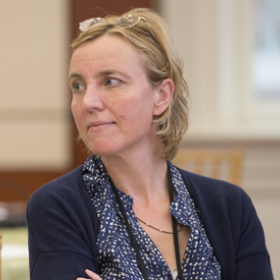
The Water-Energy Nexus in Southeast Asia and the Pacific
The EastWest Institute and the Asian Development Bank (ADB) hosted "The Water-Energy Nexus in Southeast Asia and the Pacific: Promoting Regional Stability and Economic Security," a roundtable discussion on June 24, at EWI’s New York Office. Stephen Groff, ADB’s vice president for Southeast and East Asia Operations, Csaba Kőrösi, Hungary’s ambassador to the UN and Co-Chair of the Open Working Group on Sustainable Development Goals, and Michele Ferenz, EWI’s director of the Food, Water, and Energy Nexus Program, led the discussion.
“Natural resource issues are rising on the agenda of traditional security actors,” Ferenz said. Pointing to recent commentaries by members of the U.S. military and intelligence communities on resource shocks as drivers of economic and political crises as well as of regional tensions, she added: “The three issues where there are clear disagreements between China and the U.S. are maritime security, trade and Tibet. All three of those have underlying resource conflicts attached to them.”

Groff made several key points concerning the increased role water will have in human security, emphasizing what he called “a crisis around governance” and highlighting the role the private sector can play when appropriate policies and accountability frameworks are in place. He also noted the increased awareness of the complex challenges facing water governance.
“A lot of our institutions have begun to realize that you don’t just think about water in terms of scarcity or in isolation,” Groff said, noting that this will require intensive policy dialogue with governments. “With nexus kinds of things, it’s harder to do the math around it, and it’s harder to make the case for the math.”
Kőrösi stressed the importance of building networks of cooperation within nations and between nations. He also highlighted some of the operational challenges, noting that there must be an exponential increase in the number of water experts in much of the developing world in order to head off a global disaster.
Roundtable participants, representing diverse organizations, offered expert perspectives from their fields. Annette Huber-Lee, until recently the director of the Asia Center at the Stockholm Environment Institute, made the point that scientists have to emerge from their silos to address these cross-cutting challenges. “The scientists studying water must confer with those studying energy, as we all know their findings and studies influence each other,” Huber-Lee said.
Panel members also offered concrete examples of areas in which progress has been made. Groff said that within the past decade the ADB has integrated climate-resilience in its infrastructure investments while regional energy cooperation has made strides in Asia.
Others pointed out that the pace of change is often the fastest at the local level where choosing the right terms of engagement can have a big impact. According to Mandy Ikert, director of the Water and Adaptation Initiative of the C40 Cities Climate Leadership Group, cities are now more willing to work together to create an environment of global sharing. “In many cities it may not be politically favorable to talk about climate change, but you can re-brand it to things that make sense to them locally,” Ikert explained.
Her organization currently facilitates technology exchange between Beijing and New York City, as Beijing searches for a means to employ a zero-energy fresh water supply system.
“We have Beijing that is solely reliant on one remaining clear reservoir working now with New York to determine whether they can actually have-zero energy fresh water supply as New York does,” Ikert added. “There’s a lot of global sharing happening at the local level.”
View more photos from the event on our Flickr page.

